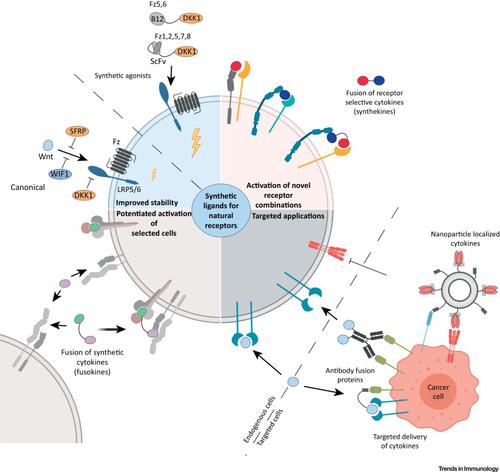当前位置:
X-MOL 学术
›
Trends Immunol.
›
论文详情
Our official English website, www.x-mol.net, welcomes your
feedback! (Note: you will need to create a separate account there.)
Immunoreceptor Engineering and Synthetic Cytokine Signaling for Therapeutics.
Trends in Immunology ( IF 13.1 ) Pub Date : 2019-02-06 , DOI: 10.1016/j.it.2019.01.001 Jürgen Scheller 1 , Erika Engelowski 1 , Jens M Moll 1 , Doreen M Floss 1
Trends in Immunology ( IF 13.1 ) Pub Date : 2019-02-06 , DOI: 10.1016/j.it.2019.01.001 Jürgen Scheller 1 , Erika Engelowski 1 , Jens M Moll 1 , Doreen M Floss 1
Affiliation

|
Cytokines control immune-related events and are critically involved in a plethora of physiological and pathophysiological processes including autoimmunity and cancer development. Accordingly, modulation of natural cytokine signaling by antibodies and small molecules has improved therapeutic regimens. Synthetic biology sets out to optimize immunotherapeutics, with chimeric antigen receptor (CAR) T cell immmunotherapy being the first example to combine synthetic biology with genetic engineering during therapy. Hence, synthetic cytokines and cytokine receptors, as well as constitutively active cytokine receptor variants, are emerging as tools to improve or modulate immunotherapeutic strategies. This review focuses on recent developments in the growing field of synthetic cytokine signaling, providing an outlook for developing applications that involve physiological targets of immunotherapy.
中文翻译:

免疫受体工程学和用于治疗药物的合成细胞因子信号转导。
细胞因子控制着与免疫有关的事件,并严重参与了许多生理和病理生理过程,包括自身免疫和癌症的发展。因此,抗体和小分子对天然细胞因子信号传导的调节具有改善的治疗方案。合成生物学着手优化免疫疗法,嵌合抗原受体(CAR)T细胞免疫疗法是在治疗过程中将合成生物学与基因工程结合起来的第一个例子。因此,合成的细胞因子和细胞因子受体以及组成型活性细胞因子受体变体正在成为改善或调节免疫治疗策略的工具。这篇综述着重于合成细胞因子信号转导不断发展的领域中的最新进展,
更新日期:2019-02-07
中文翻译:

免疫受体工程学和用于治疗药物的合成细胞因子信号转导。
细胞因子控制着与免疫有关的事件,并严重参与了许多生理和病理生理过程,包括自身免疫和癌症的发展。因此,抗体和小分子对天然细胞因子信号传导的调节具有改善的治疗方案。合成生物学着手优化免疫疗法,嵌合抗原受体(CAR)T细胞免疫疗法是在治疗过程中将合成生物学与基因工程结合起来的第一个例子。因此,合成的细胞因子和细胞因子受体以及组成型活性细胞因子受体变体正在成为改善或调节免疫治疗策略的工具。这篇综述着重于合成细胞因子信号转导不断发展的领域中的最新进展,































 京公网安备 11010802027423号
京公网安备 11010802027423号